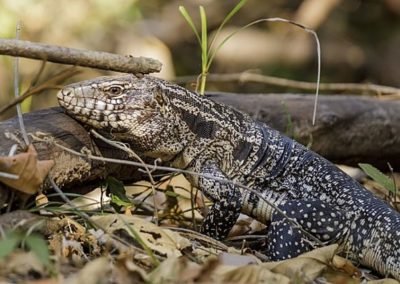The ocean is the last unexplored frontier on Earth.
Lurking in the depths are links to the ancient world.
And a fossil hunter in Florida made one scary find while diving in the Gulf Coast.
A diver makes a shocking find in the waters off Florida’s coast
A Florida man made an amazing discovery while searching for fossils in the waters off Englewood, Florida.
Alex Lundberg and a friend were exploring the ocean floor in the Gulf of Mexico.
He found what he thought at first was a piece of wood before closer inspection revealed it was something from the ancient world.
Previous fossil hunts in that area of the ocean floor had turned up bones from long-extinct species of jaguar and the teeth of wooly mammoths.
“We kind of knew there could be one in the area,” Lundberg said.
He kept removing the sand from the mysterious object and it kept growing.
“I look over, and I see what looks like a 6-inch piece of wood uncovered in the sand, and I swim over to it, and I started fanning it, trying to get the sand off of it,” Lundberg recalled. “It just kept getting bigger and bigger.”
It turned out he had uncovered a tusk from a mastodon.
The massive tusk was four feet long, a foot wide, and weighed 60 pounds.
“Finding small pieces and chunks of tusk is common, but finding one this large and well-preserved is very rare,” Lundberg explained. “Tusks found in Florida are normally very delicate and usually crumble apart.”
But an intact tusk is “super rare.”
Lundberg needed the help of his diving buddy to get it back to the surface.
“I just show her this four-foot tusk and her eyes just light up,” Lundberg said. “She comes up with me to the surface, we swim it to the boat. We made a sling out of a beach towel and kind of hoisted it over the side of the boat. It’s absolutely surreal that it came up in one piece, didn’t break apart at all”.
The mastodon went extinct in North America more than 10,000 years ago.
A cousin to the mammoth and an ancestor of the elephant, they stood up 10 feet tall and weighed up to 16,000 pounds.
Fossil hunter could be forced to turn over his tusk to a museum
Lundberg, who studied marine biology at the University of South Florida, said that he’s been hunting fossils since he was old enough to walk.
“My dad would take us out to construction sites all the time to look for fossils as a kid,” Lundberg explained.
Florida law states that fossils found on state lands and the water along the coast belong to the Florida Museum of Natural History.
“The museum will review the discoveries and localities to determine their significance and the permit holder can keep the fossils if the museum does not request them within 60 days of reporting,” Museum collections manager Rachel Narducci said. “This may be a significant find depending on exactly where it was collected.”
Lundberg thought he would be able to hang on to it.
“It’s just been kind of rolling around on the ocean floor for at least the last 10 million years,” Lundberg said. “Its scientific value is limited, it’s just more of a cool display piece at this point.”
A fossil hunt on the ocean floor turned up an ancient relic that Alex Lundberg will treasure for the rest of his life.
DeSantis Daily will keep you up-to-date on any new developments in this ongoing story.









